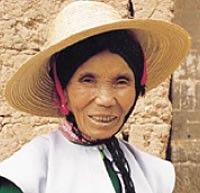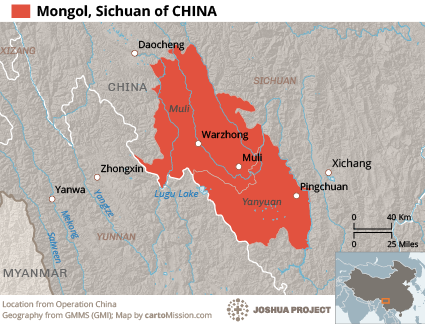Joseph Rock was the first recorded foreigner to visit the Sichuan Mongols in 1924. He described the town of Youngning as "the seat of three chiefs whose ancestors were Mongols, elevated to power by Kublai Khan in the 13th century." Rock adds, "When the great Mongol Emperor marched through the territory about Youngning, 1253 AD, he left one of his relatives to rule the Hlihin tribesmen." Before communist rule, the Mongol king acted as a warlord over the whole region. "When the communists took over, they deposed him, not killing him so as not to make him a martyr in the people's eyes." The Mongol palace was destroyed, and the prince was sent to a reeducation camp for several years. The prince, La Ping Chu, is still alive today and respected by his people, although he is not allowed to rule. Many older Mongols still bow their heads in respect when they pass him on the street.
The Sichuan Mongols are officially counted as part of the Mongolian nationality in China. They are a distinct ethnolinguistic group, however, from all other Mongolian peoples. They call themselves Mongols and possess their own clothing, history and language. All other peoples in the region recognize them as Mengzu (Mongols).
Most Sichuan Mongols are farmers or fishermen, leading quiet lives in their remote villages. They observe Buddhist festivals, "hoping some day their kingdom will be restored to them."
Tibetan Buddhism, also known as Lamaism, is the stronghold of the Sichuan Mongols. There is a temple in active use just behind the prince's house. Most temples and altars were destroyed during the Cultural Revolution.
Very few Sichuan Mongols have ever heard the name of Jesus Christ. One person who has heard the gospel is the prince himself, witnessed to by foreign visitors a few years ago. A prayer for healing was offered for the prince, who could not stand up straight because of a stomach ulcer. He was completely healed. The Sichuan Mongols are surrounded by unreached people groups on every side; therefore, there are no Christian communities nearby who could reach them. Gospel radio broadcasts in Mandarin have had little effect because few understand Chinese.
Without the guidance of Christ, these people are like sheep without a shepherd. They need the good shepherd in their families and communities.
Pray for the authority of Christ to bind hindering spiritual forces to lead them from darkness to light.
Pray for signs and wonders to happen among them and for great breakthroughs with a rapid multiplication of disciples and house churches.
Pray for bold workers who are driven by the love of the Holy Spirit to go to them.
Pray for an unstoppable movement to Christ among them.
Scripture Prayers for the Mongol, Sichuan in China.
Operation China, Asia Harvest, Copyrighted © Used with permission
| Profile Source: Joshua Project |











